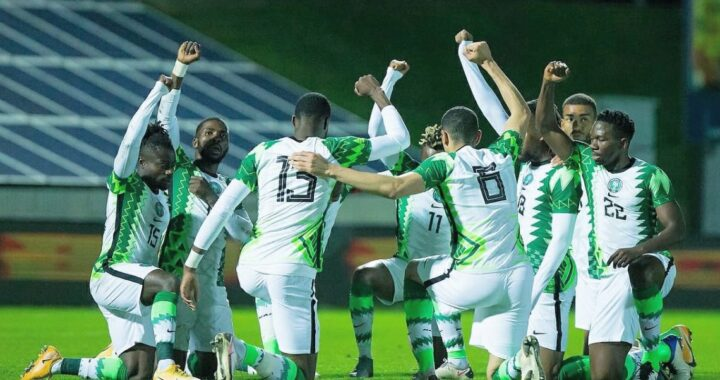Editorial
S’Eagles And Lessons From AFCON 2021

When the Nigeria’s national team, the Super Eagles landed in Garoua, Cameroon for the 33rd edition of Africa Cup of Nations, tagged, Cameroon 2021, few Nigerians and football observers gave them little or no chance to make palpable impact at the biennial continental football fiesta.
Perhaps, the pessimism stemmed from the apparent confusion and air of uncertainty surrounding the team. Only few weeks back, Gernot Rohr, the national team’s Head Coach for over five years had just been sacked and Augustine Eguavoen, Nigeria Football Federation, NFF’s Head of Technical Department, former national team coach and an ex-international was given the mantle, albeit, on an interim basis to lead the Super Eagles to Cameroon 2021.
Three matches into the championship, Eguavoen and his wards won the hearts and support of not only Nigerians but football followers across the continent and beyond. The Super Eagles did not only beat the almighty Pharoahs of Egypt with their trumpeted striker, Mohamed Salah, they overcame Sudan and Guinea Bissau to qualify from Group D with maximum points, a feat the team did not achieve once under Rohr.
The group stage performances were enough to make Nigerians and even the team to dream dreams. The team was being tipped to go all the way to the title for the fourth time in history. However, the Super Eagles and their fans’ dreams and expectations came crashing down in the first knock out stage as the Carthage Eagles of Tunisia clipped the Super Eagles’ wings and dumped them out of the competition with a lone goal victory.
Indeed, the Round of 16 match was a triumph of superior tactical nous over technical naivety and inability to react and adopt a plan B in the face of opponents’ counter-measures by the Nigerian bench. In the end, what had begun as a glorious quest for another diadem ended in utter anguish and disappointment for the team and its teeming fans.
Regrettably, all the plaudits being heaped on the team degenerated into disappointment, fury and condemnation of unimaginable proportion, especially on social media. Individual players have been singled out for blame and criticism, particularly, goalkeeper Maduka Okoye, Alex Iwobi and Ola Aina, who many saw as being responsible for the unexpected loss to Tunisia. We, however, condemn this sad development, it does not and should not be brought to bear within our football in particular and sports in general. Football is a team game and a side wins or loses as a team.
That the Super Eagles lost at the Round of 16 stage should not stampede Nigerians, particularly, the NFF to write off the team and the good works done by the interim coach and his backroom staff. It is not the time for the football authorities to fall back to the practice of believing that indigenous coaches cannot tinker the national teams. Though we believe that with a little more technical depth, the Super Eagles could have progressed further in Cameroon, Coach Eguavoen has shown that with more encouragement and exposure, indigenous coaches can take the national teams to the next level. Many of them have done it before, even at youth level and with the national teams of other countries, and can do it again with the right environment and cooperation.
At the Cameroon 2021, Eguavoen showed that the Super Eagles have not lost the Nigerian way and can still play with verve. The team spirit, commitment and determination among the players and dressing room harmony were commendable. In fact, the usual rancour that headline Nigeria’s outing in major sporting events was non-existent. Thankfully, the Nigeria Football Federation had said that the interim coach was not given any target to meet in Cameroon.
That is why we think that the NFF and indeed all Nigerians should focus on and take the positives from the Eagles outing and build on it for better result going forward. No one should allow the disappointment of the Eagles’ ouster to hold him captive and lose the essence of the bigger picture.
As the team gears up for the task ahead, especially, the Qatar 2022 World Cup Qualifier against Ghana, we expect the NFF to ensure a strong synergy between Eguavoen and the incoming Head Coach in order to pull some pages of his books for a stronger and more efficient national team. Also, critical stakeholders and players must be accommodated and be given a true sense of belonging in the scheme of things for not only the Super Eagles, but all the national teams to fulfill their potentials and ride the crest of football glory.
Editorial
As NDG Ends Season 2

Editorial
Beginning A New Dawn At RSNC

Editorial
Sustaining OBALGA’s Ban On Street Trading

-
Maritime5 days ago
Nigeria To Pilot Regional Fishing Vessels Register In Gulf Of Guinea —Oyetola
-

 Sports5 days ago
Sports5 days agoGombe-Gara Rejects Chelle $130,000 monthly salary
-
Maritime5 days ago
Customs Declares War Against Narcotics Baron At Idiroko Border
-

 Sports5 days ago
Sports5 days agoTEAM RIVERS SET TO WIN 4×400 ” MORROW” …Wins Triple jump Silver
-

 Sports5 days ago
Sports5 days agoNPFL Drops To 91st In Global League Rankings
-
Maritime5 days ago
NIMASA,NAF Boost Unmanned Aerial Surveillance For Maritime Security
-

 Sports5 days ago
Sports5 days agoNIGER DELTA GAMES PANACEA TO YOUTH DEV”
-

 Sports5 days ago
Sports5 days agoNPFL Impose Fines On Kwara United Over Fans Misconduct

